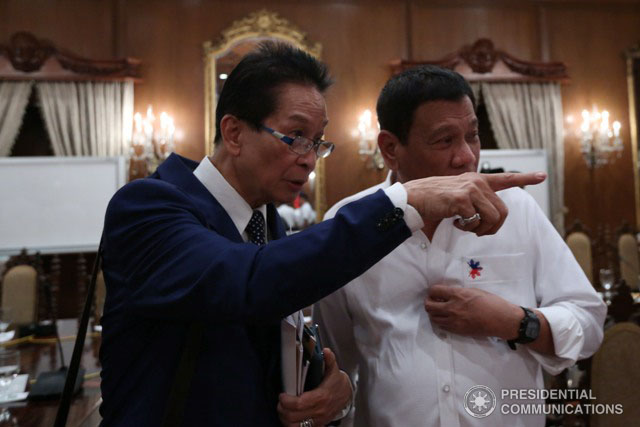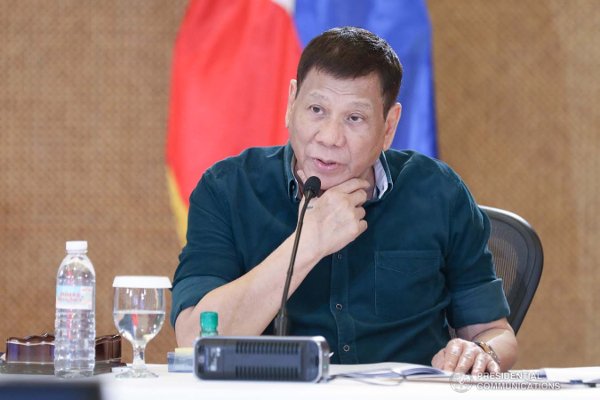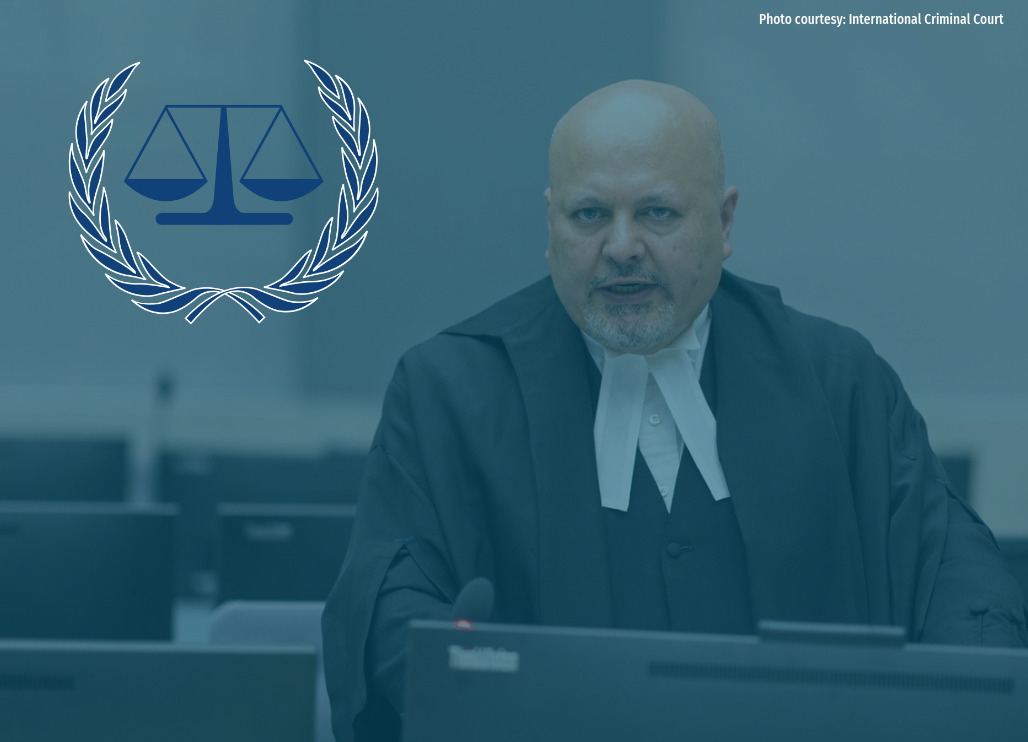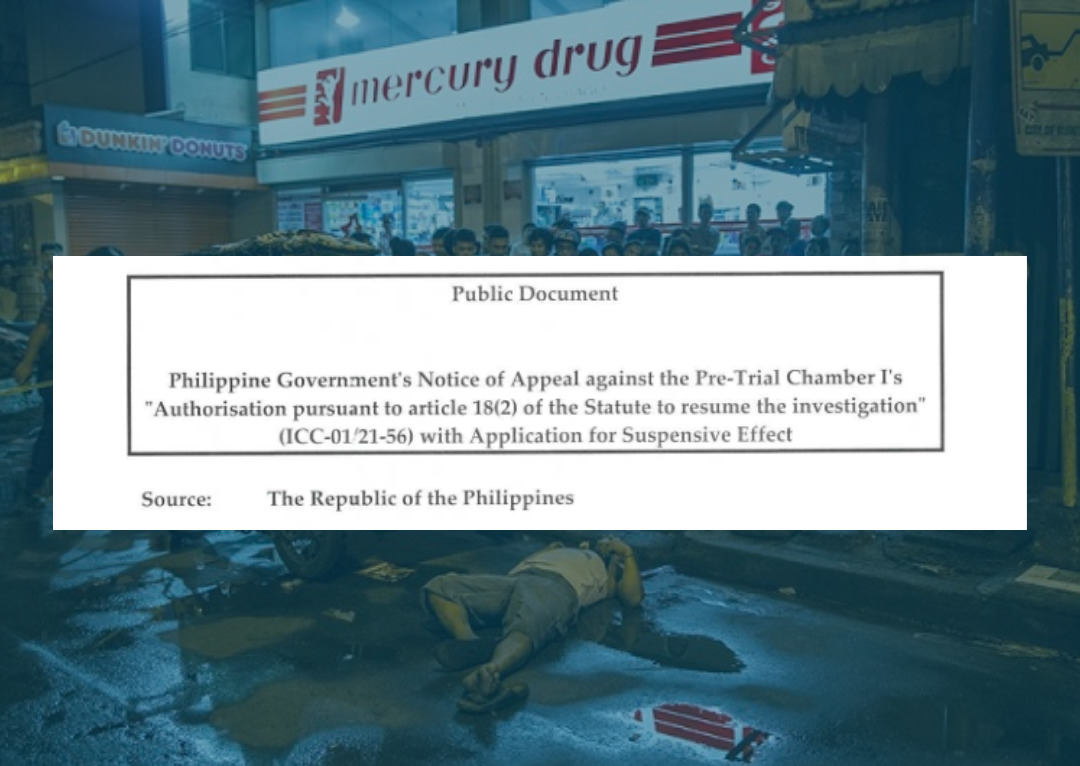President Rodrigo Duterte and his chief legal counsel Salvador Panelo made three inaccurate claims about the International Criminal Court (ICC) in a recorded public address on July 28.
Toward the end of his weekly “Talk to the People” broadcast, Duterte and Panelo welcomed the March 16 ruling of the Supreme Court (SC) dismissing three petitions questioning the validity of the president’s unilateral decision to withdraw the Philippines from the ICC.
However, the two officials questioned part of the SC’s ruling in which the Philippines is still obliged to cooperate with the Hague-based court even after it has officially withdrawn from the Rome Statute in March 2019.
A request to investigate alleged crimes against humanity in the Philippines over the deaths of 12,000 to 30,000 related to Duterte’s war on drugs is pending in the ICC’s Pre-Trial Chamber.
Here are Duterte and Panelo’s inaccurate claims:
On the Philippines’ cooperation with the ICC
STATEMENT 1
Panelo to Duterte: Sapagka’t kung matatandaan ninyo, hindi po ba, ‘yung sa ICC ang inyong naging posisyon doon ay talagang wala silang jurisdiction. At kahit na nga mayroon, wala pa rin dahil ‘yung Article 127 maliwanag na sinasabi … kung nagsimula na ang imbestigasyon ng hukuman, kahit kumalas ka, puwede ka pa. Ang problema, hindi naman nagsimula ‘yung imbestigasyon sa hukuman, preliminary examination lamang.”
(If you remember, [your] position was that the ICC does not have jurisdiction. And even if it does, still it doesn’t because Article 127 clearly states… if the court investigation has already started, even if you have already withdrawn, you still can. The problem is, the investigation has not started in court, it is only a preliminary examination.)
Source: RTVMalacanang, Talk to the People, July 28, 2021, watch from 1:18:24 to 1:18:47 (transcript)
FACT
Contrary to Panelo’s claim, obliging a former state party to continue cooperating with the ICC is not limited on the grounds of an ongoing investigation. Section 2 Article 127 of the Rome Statute says the withdrawal shall not affect “any matter” that was already under consideration by the court prior to its effectivity.
“A State shall not be discharged, by reason of its withdrawal, from the obligations arising from this Statute while it was a Party to the Statute, including any financial obligations which may have accrued. Its withdrawal shall not affect any cooperation with the Court in connection with criminal investigations and proceedings in relation to which the withdrawing State had a duty to cooperate and which were commenced prior to the date on which the withdrawal became effective, nor shall it prejudice in any way the continued consideration of any matter which was already under consideration by the Court prior to the date on which the withdrawal became effective.” (emphasis ours)
Source: International Criminal Court, Rome Statute, Accessed Aug. 3, 2021
The SC upheld the provision in its 101-page March 16 decision, saying the Philippines is still “covered and bound” to cooperate with the ICC even after its official withdrawal from the Rome Statute took effect in March 2019.
Last May, then ICC prosecutor Fatou Bensouda formally requested authorization from the court’s Pre-Trial Chamber to allow her office to investigate drug-related killings in the Philippines from November 2011 to March 17, 2019, when the country was still a member of the Statute.
Bensouda based the request on the findings of her office’s three-year preliminary examination into Duterte’s drug war that began in February 2018, which triggered the president’s order to withdraw the Philippines from the Rome Statute. She alleged that government and police officials connived with vigilante groups to kill suspected drug personalities. (See Gov’t officials, police conspired to carry out Duterte’s war on drugs — ICC prosecutor – Vera Files)
Should the chamber grant Bensouda’s request, her successor Karim Khan will launch the investigation, and warrants of arrest or summonses will be issued to Filipino officials allegedly involved in the killings to compel them to appear before the ICC.
On the ratification of the Rome Statute
STATEMENT 2
Duterte: Walang kopya ang executive department kasi nga ang nangyari galing sa Congress, ni-ratify ng Congress, instead of returning the treaty as ratified by Congress dito sa executive department ni Estrada at that time, hindi na nila —- shinort (short) circuit nila. Dumiretso na kaagad sila sa Rome and appended the Philippine participation.
(The executive department does not have a copy because when the Congress ratified it [Rome Statute], instead of returning the treaty as ratified to the executive department of Estrada at that time, it short circuited [the process]. They went immediately to Rome and appended the Philippine participation.)
Source: RTVMalacanang, Talk to the People, July 28, 2021, watch from 1:22:23 to 1:23:03 (transcript)
FACT
The Philippine government ratified the Rome Statute in August 2011, under the administration of the late President Benigno Aquino III. A Philippine delegation, including former senator Loren Legarda, submitted later in the month the ratification documents of the statute to the United Nations (UN) headquarters in New York City, U.S.A.
The government took 11 years to ratify the Rome Statute since the Philippines became a signatory in December 2000 under former President Joseph Estrada. In November 2011, the statute entered into force in the Philippines.
In compliance with the requirements of the 1987 Constitution, Aquino signed the statute first in May 2011, before seeking concurrence of the Senate. Three months later on Aug. 23, the Senate approved the ratification after conducting a hearing during which various government agencies and public interest groups, including the Foreign Affairs and Justice departments, endorsed the Rome Statute.
Other public offices that pushed for the statute were the Philippine National Police, Department of National Defense, Commission on Human Rights, Armed Forces of the Philippines, Philippine National Police and the National Security Council.
On the composition of ICC’s roster of judges
STATEMENT 3
Duterte: Bakit ako haharap ng husgado na puro puti ang mga p***** i** niya? Kung ako’y magpalitis — anong kasalanan ko — it will be before a Philippine court and before a Filipino judge na kung sabihin niya na ako na death penalty. So be it; tanggapin ko.
(Why will I face a court full of white people[,] those sons of b*tches? If I will be litigated — what’s my crime — it will be before a Philippine court and a Filipino judge who will punish me with death penalty. So be it; I will accept it.)
Source: RTVMalacanang, Talk to the People, July 28, 2021, watch from 1:28:58 to 1:29:27 (transcript)
FACT
Ten of the 18 judges in the ICC are from African (4), Latin American and Caribbean (4), and Asia-Pacific (2) countries. Eight others are from Western and Eastern European and other groups of states.
According to the Rome Statute, only state parties are allowed to elect judges in the ICC. The Assembly of States Parties elects judges, who each typically serve a nine-year term, in a process that “takes account” of “fair representation of men and women” and “equitable geographical distribution,” among other considerations.
The Philippines could be eligible to nominate and elect judges in the ICC had it not withdrawn from the Rome Statute. In the course of its membership to the Rome Statute, the Philippines nominated three Filipinos to the ICC, with the last nominee in 2017.
Law professor Raul Pangalangan, who ended his six-year tenure in March, was the only Filipino who served as a judge in the ICC. The late senator Miriam Defensor-Santiago, who pushed for the ratification of the Rome Statute in 2011, was supposed to be the first Filipino judge in the ICC, but she resigned in 2014, before she could be sworn in, due to medical reasons.
This has been at least the third time that Duterte made the wrong insinuation that judges of the ICC were mostly “white” people.
(See VERA FILES FACT CHECK: Duterte wrong in claiming ‘all’ ICC judges are ‘White’ – Vera Files and ICYMI: Reiterating that he will not cooperate with the International Criminal Court – ICC, President Rody Duterte repeated on June 21 a wrong claim that the #ICC was a court of “white people.”)
Sources
RTVMalacanang, Talk to the People, July 28, 2021 (transcript)
International Criminal Court, Rome Statute, Accessed Aug. 3, 2021
United Nations, Rome Statute of the International Criminal Court, Accessed Aug. 3, 2021
Supreme Court, G.R. No. 238875/G.R. No. 239483/G.R. No. 240954. July 21, 2021
International Criminal Court, Statement of the Prosecutor, Fatou Bensouda, on her request to open an investigation of the Situation in the Philippines, June 14, 2021
International Criminal Court, Request for authorization , May 24, 2021
United Nations, Philippines ratifies the Rome Statute of the International Criminal Court, Aug. 30, 2011
Senate of the Philippines, Press Release – Legarda: The Philippines becomes 117th State Party to the Rome Statute of the International Criminal Court, Aug. 31, 2011
Official Gazette, Foreign Affairs Secretary urges Senate concurrence to Rome Statute establishing International Criminal Court | GOVPH, July 28, 2011
United Nations, Rome Statute, Accessed Aug. 4, 2021
Senate of the PhIlippines, Resolution No. 57, 15h Congress,, Aug. 23, 2011
International Criminal Court, Who’s who – Judicial Divisions, Accessed Aug. 4, 2021
International Criminal Court, Note Verbale, Aug. 25, 2017
International Criminal Court, Judge Raul Cano Pangalangan, Accessed Aug. 4, 2021
International Criminal Court, ICC W eekly Update #213, Accessed Aug. 4, 2021
(Guided by the code of principles of the International Fact-Checking Network at Poynter, VERA Files tracks the false claims, flip-flops, misleading statements of public officials and figures, and debunks them with factual evidence. Find out more about this initiative and our methodology.)





